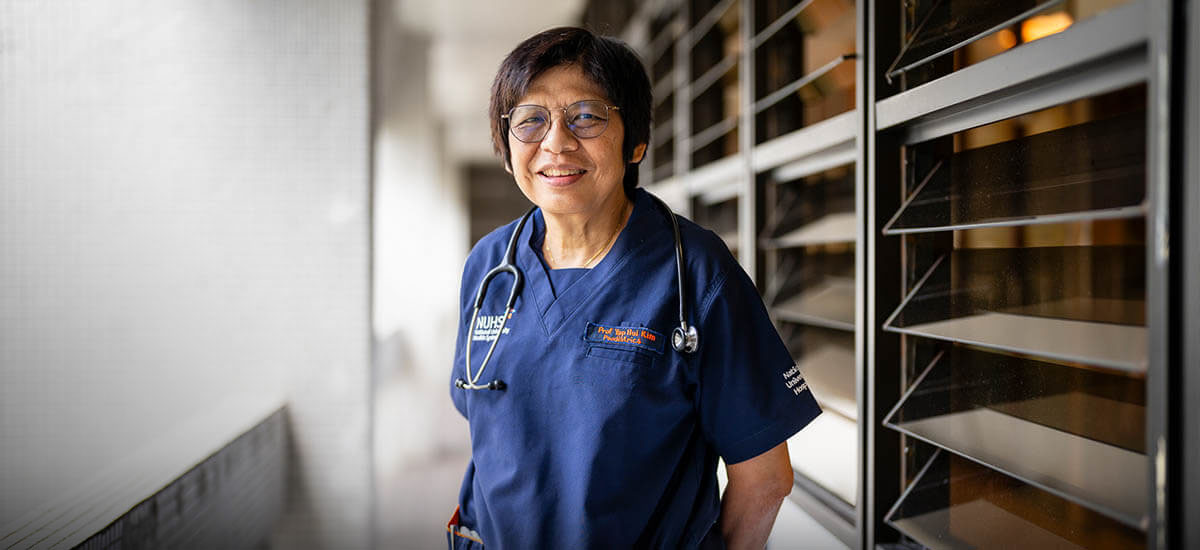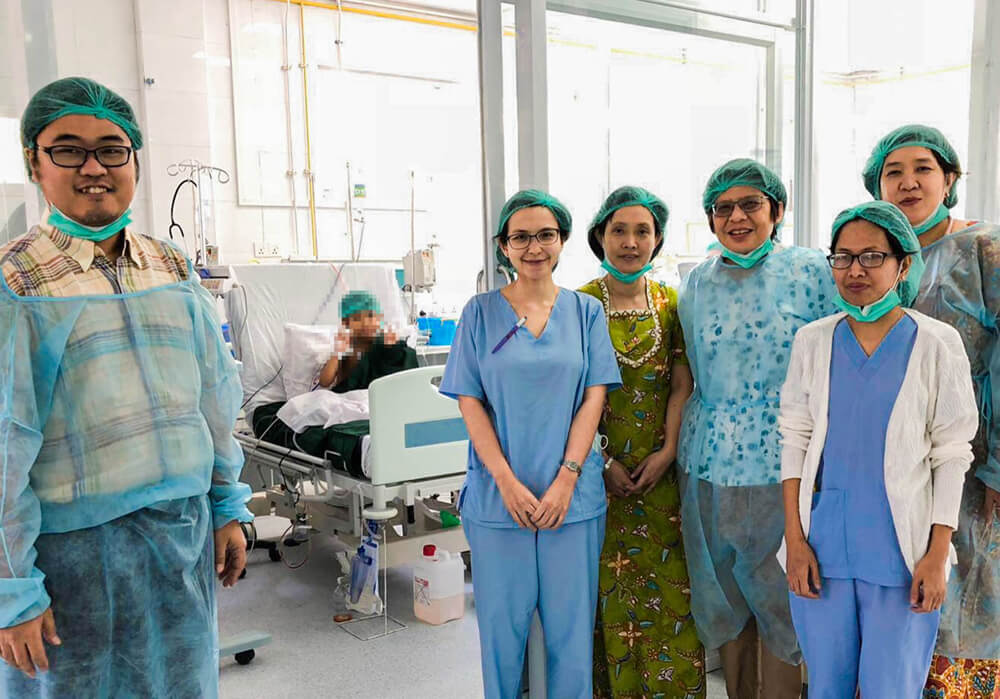Published on 1 February 2024
Training clinicians from developing countries is part of this medical director’s work under the NUH Global Fellows Alliance programme.
It can be hard to imagine Singapore without the world-class healthcare system we’ve come to be known for. But Prof Yap Hui Kim, Medical Director of the Paediatric Transplantation Programme at National University Hospital’s (NUH) National University Centre for Organ Transplantation, vividly recalls a time where patients’ options were more limited.
Back in the 1980s when she first entered the profession, outcomes for young patients with kidney conditions were dire. “You would basically see them die. My job was to tell so many families that there was nothing I could do for them because we simply did not have the resources or knowledge to help,” said Prof Yap.
In 1985, the then 31-year-old lecturer flew to California in the United States for a two-year fellowship, which proved a game-changing experience. There, she learnt about how paediatric kidney conditions can be treated and managed through dialysis and in some cases, transplants. She brought her lessons back home and kickstarted a successful renal unit for children at NUH. Since 1989, when the department started its transplant programme, more than 70 patients have received transplants in the centre.
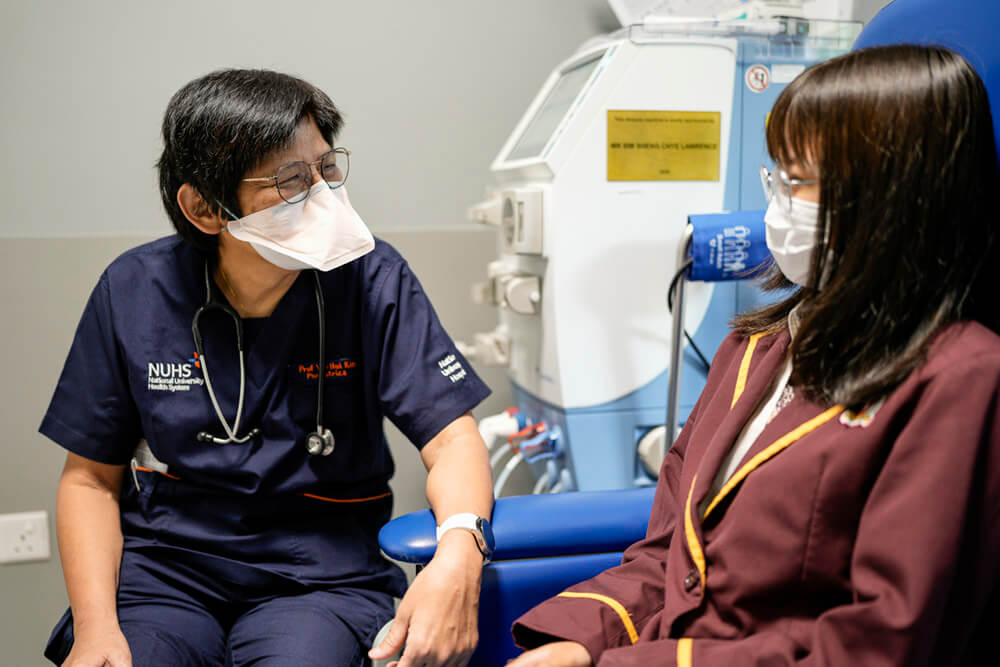
Prof Yap Kim Hui attends to young patients with kidney conditions.
The overseas experience also exposed Prof Yap to the importance of public-private partnerships in funding care for kidney treatment, which is often costly. “There, the hospitals would raise funds with support from Hollywood stars. I thought we could do something similar with corporates,” reflected Prof Yap. Inspired by how learning from others allowed her to make a positive impact at home, she decided to pay it forward and support fellow healthcare professionals from developing countries.
Within this commitment, Prof Yap began welcoming clinicians from around the world to NUH, under the NUH Global Fellows Alliance. This programme encourages fellowship trainees from around the world to collaborate, share innovative healthcare solutions, and contribute to advancing medical knowledge in the region and beyond.
Building capacity to save lives
A clinician who has benefitted greatly from the fellowship programme is Dr Aye Kyawt Khant from Myanmar’s Yangon Children’s Hospital, who visited Singapore in 2014 to train under Prof Yap. Then a registered paediatrician of four years, she had not been able to pursue her interest in renal medicine owing to a lack of resources and knowledge in her country.
“Chronic kidney disease is a silent killer in Myanmar, and we had quite a few patients who needed transplants and dialysis, which we were unable to provide back then,” shared Dr Aye. That changed after her trip to Singapore. In 2018, the Yangon Children’s Hospital successfully performed its first paediatric renal transplant with the help of the International Society of Nephrology and NUH. Dr Aye was an instrumental member of the team.
Prof Yap Hui Kim (third from right) and Dr Aye Kyawt Khant (third from left), with the medical team at Yangon Children’s Hospital, which performed its first paediatric renal transplant in 2018.
As for her approach in training Dr Aye, Prof Yap shared that she adopted a “train the trainer” method. “It was crucial that we didn’t just tell them what they needed to know as doctors,” she explained. “For true mission success, we had to equip trainees with knowledge of every aspect of paediatric renal care, including nursing. That way, they could lead teams efficiently when they went back,” she added.
Dr Aye noted that the training covered theoretical lessons in the science behind a transplant, as well as practical pointers on operational hazards to watch out for and the correct way to wash her hands before surgery. These, she contended, were critical to her team’s success.
Since then, Dr Aye has been involved in two other transplants and provided aftercare to patients who had returned from India where they received transplants. She is now a paediatric nephrologist.
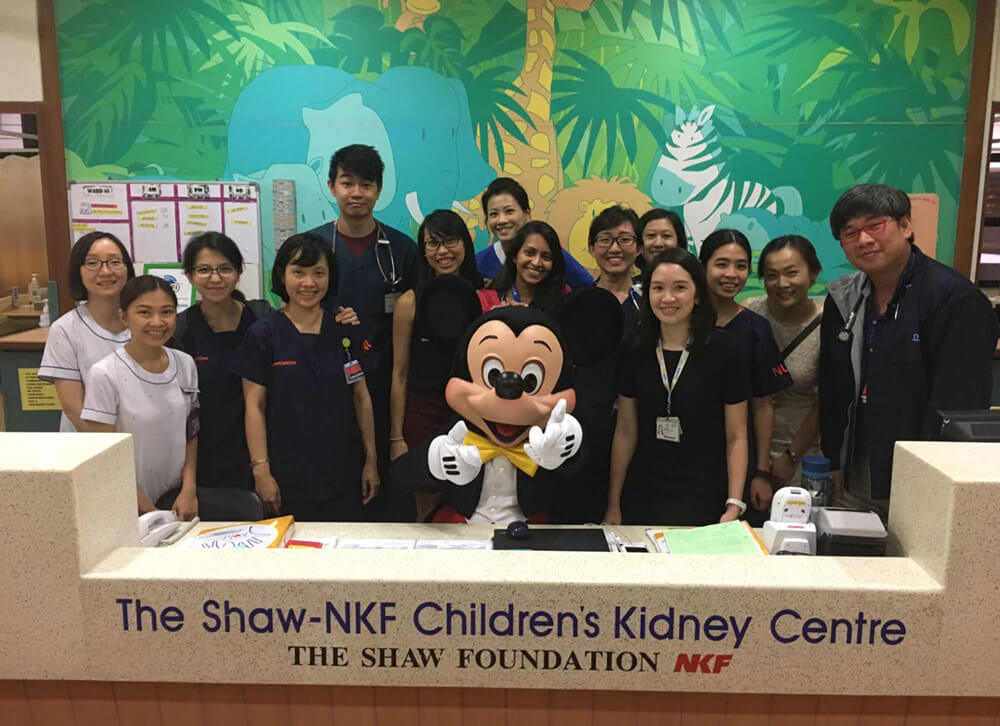
Dr Aye Kyawt Khant (fourth from left) working alongside the team at the Shaw-NKF-NUH Children’s Kidney Centre during her fellowship training.
“Through the Global Fellows Alliance at NUH, knowledge transcends borders, turning individual learnings into collective advancements in healthcare,” said Dr Aye.
Ripples of change
The Global Fellows Alliance seeks to replicate such success stories in other countries and medical disciplines. It complements NUH’s wider clinical fellowship scheme incepted in 2000, through which more than 900 clinical fellows and clinicians from around the world have gained exposure to Singapore’s healthcare industry and honed their skills in various clinical specialities. The newly-launched Alliance will expand on the scheme’s efforts, with a greater emphasis on networking opportunities, professional development, resource-sharing and collaborations on research and development.
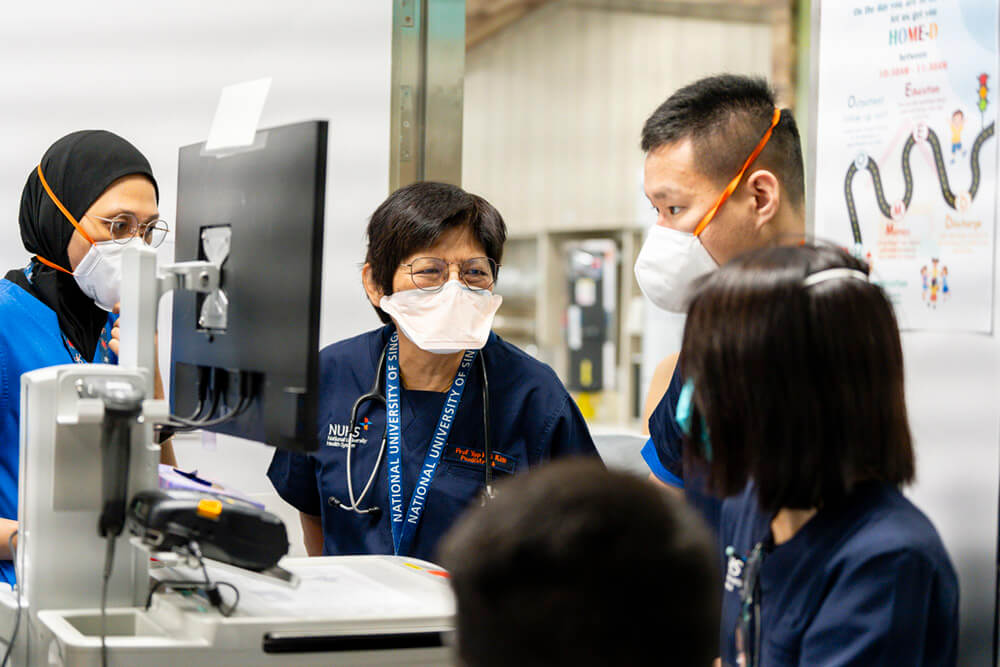 Prof Yap (second from left) has served as a mentor for various clinicians over the years.
Prof Yap (second from left) has served as a mentor for various clinicians over the years.
For Prof Yap, a pioneer in cross-border knowledge exchange, the Alliance is a welcome initiative. She has involved her entire department in it, believing it to be mutually beneficial to both visiting and host clinicians. “Through our collaborations and conversations, we learn about how to deal with scenarios that we may not commonly see in Singapore,” she said, citing drug poisoning as an example. “This kind of training keeps us on our toes. It’s valuable for everybody involved.”
A force for good
The key features of the Global Health Alliance are:
Networking opportunities: The programme will facilitate connections with healthcare professionals from diverse backgrounds, creating an extensive global network of clinicians who can share knowledge and best practices.
Professional development: Tailored workshops, training and coaching for continual growth will cover a wide range of medical disciplines.
Extensive resources: Members can stay updated on the latest in medicine through access to comprehensive resources.
A community of leaders: Fellows have the opportunity to collaborate on research and drive meaningful and groundbreaking improvements in healthcare, across communities.
In consultation with Prof Yap Hui Kim, Head & Emeritus Consultant, Division of Paediatric Nephrology, Dialysis and Renal Transplantation, Department of Paediatrics, Khoo Teck Puat – National University Children's Medical Institute (KTP-NUCMI), and Medical Director & Emeritus Consultant, Paediatric Kidney Transplantation Programme, National University Centre for Organ Transplantation (NUCOT), National University Hospital (NUH).

